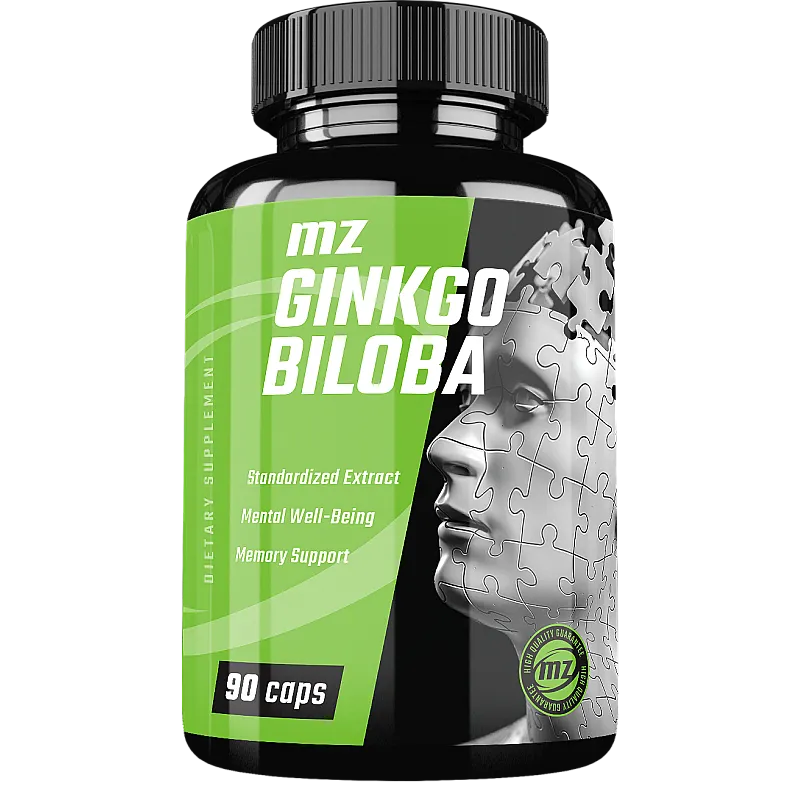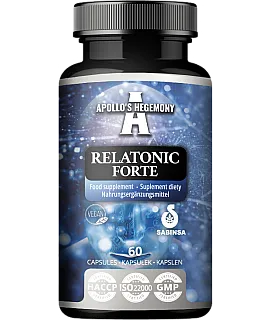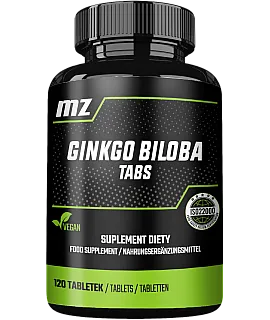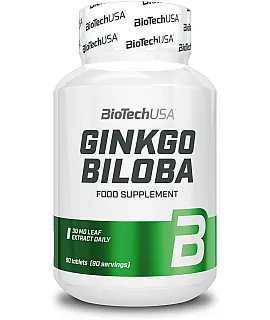What action does ginkgo biloba have? Find out what it can do for your brain and heart

Ginkgo biloba is the name you will see on the displays of most pharmacies. The herb is used as a dried herb for making infusions, as dietary supplements in capsules and tablets, and even as over-the-counter medicines. Standardized extracts of Ginkgo are some of the most widely sold herbal preparations in Europe and the US. It's a very popular choice when the need arises to improve memory and overall brain capacity, especially in older people. However, the benefits of this plant do not end there. The effects of Ginkgo biloba are well documented in hundreds of respected scientific papers. They mention neuroprotective, anticoagulant, anti-aging, antioxidant and eye health supporting effects. From this article, you'll learn what actions of Ginkgo biloba are confirmed by research and what effects you can expect from supplementation. Read to the end!
.
Ginkgo not so Japanese
Although the name Ginkgo biloba is strongly recognized, it is not true. Specifically, the term "Japanese" misses the mark. In fact, the tree has never occurred naturally in Japan. Ginkgo is believed to have originated in the remote mountain valleys of Zhejiang Province in eastern China.
The correct name of the plant is Ginkgo biloba. However, for the purposes of this article, we will stick with the more common, colloquial name Ginkgo biloba.
Ginkgo is also a very old plant, having appeared on earth much earlier than Japan or any other country. It is even considered one of the oldest tree species to have existed on Earth. Ginkgo trees date back to the Permian period, about 286-248 million years ago.
The adult tree has a large trunk with a circumference of about 7 meters and a height of about 30 meters. Today it is cultivated in many parts of the world as an ornamental tree, among other things.
What is hidden in it? That is, the active ingredients
Ginkgo leaves are a wealth of active ingredients. There are both common flavonoids, which we also know from many other plants, and unique substances with powerful effects that are specific to Ginkgo.
The two most notable groups of ingredients naturally contained in Ginkgo leaves are[1][3]:
- flavonoid glycosides - this group includes quercetin, isorhamnetin and kemferol, among others;
- terpene lactones - including bilobalide and ginkgolides.
Popular extracts included in dietary supplements have standardizations for both substances, usually at 24% glycosides and 6% lactones.
It's worth leaning towards the latter group of substances, as this is what makes Ginkgo stand out. In the form of lactones, there are two types of terpenoids in Ginkgo: ginkgolides and bilobalide. Ginkgolides are diterpenes found in 5 types, A, B, C, J and M, where types A, B and C account for about 3.1% of the total Ginkgo leaf extract. Bilobalide, which is a sesquiterpene trilactone, accounts for the remaining 2.9% of the total standardized ginkgo leaf extract[1]. Most of Ginkgo's effects observed in clinical trials are due to this group of substances.
There are also organic acids in Ginkgo, which are usually not standardized, but their contribution is estimated at 5-10% by weight of the extract.
Effects of Ginkgo biloba on the body
There are many mechanisms of action that Ginkgo boasts. Ginkgo's action stems from its function as[2]:
- a neuroprotective agent,
- antioxidant,
- free radical scavenger,
- membrane stabilizer,
- inhibitor of platelet-activating factor.
Ginkgolide B is mainly responsible for the above actions. Other pharmacological effects include[2]:
- endothelial relaxation mediated by inhibition of 3',5'-cyclic GMP (guanosine monophosphate) phosphodiesterase,
- inhibition of age-related loss of muscarinergic and α-adrenergic cholinergic receptors,
- stimulation of choline reuptake in the hippocampus,
- inhibition of beta-amyloid deposition.
Potent antioxidant activity
Oxidative stress, especially when chronic, is an absolute enemy of health. Along with chronic inflammation, it is strongly linked to the aging process. Excessive production of reactive oxygen species can lead to irreversible cell damage and is linked to a variety of diseases such as diabetes, obesity, hypertension, cardiovascular disease, cataracts, neurodegenerative diseases and cancer.
The antiradical effect is due to the presence of both flavonoid glycosides and terpene lactones. Reducing oxidative stress is one of the fundamental properties of Ginkgo, which promotes overall health support on many levels. Two proposed mechanisms of antioxidant action are[1]:
- direct scavenging of free radicals,
- indirect inhibition of free radical formation.
It can also increase the activity of antioxidant enzymes such as superoxide dismutase (SOD), glutathione peroxidase (GPX), catalase or hemoxygenase-1, thus indirectly contributing to the control of oxidative stress.
Ginkgo leaf extract can remove reactive oxygen species (ROS) such as hydroxyl radicals (OH˙), superoxide radical (ROO˙), superoxide anion radical (O2-˙), nitric oxide radical (NO˙) and hydrogen peroxide (H2O2).
Hand in hand with the reduction of free radicals comes antioxidant activity. This is due, among other things, to the inhibition of cyclooxygenase-2 (COX-2) by flavonoids. Antioxidant and anti-inflammatory activities affect all properties of Ginkgo, which will be described later in the article.
Effects of Ginkgo biloba supplementation in practice
Ginkgo's documented health-promoting uses in China date back nearly 5,000 years, mainly for the treatment of asthma. Both the leaves and nuts of this tree have long been used in traditional Chinese medicine. In fact, the nuts are known to have a longer history of use, as they were first mentioned in Yuan Dynasty herbal articles [1280-1368 AD], published in 1350 AD. For more than 5,000 years, the seeds (nuts) have been known to aid in the treatment of lung diseases (such as asthma, cough and diuresis), alcohol abuse and cystitis, while the leaves were mainly used for heart and lung dysfunction and skin infections. Nowadays, virtually only the leaves and their extracts are used.
Effects on memory and brain health
Ginkgo biloba extract preparations are most often used in the early stages of Alzheimer's disease, vascular dementia, chromias and tinnitus of vascular origin. They are also increasingly used for milder problems, or even by healthy people as part of the prevention of diseases of the nervous and cardiovascular systems and as part of anti-aging measures.
Effects on improving cognitive function, memory, dizziness, dyslexia and other neuropsychiatric disorders, have been demonstrated in a number of human clinical trials using Ginkgo biloba leaf extract[1]. However, not every study has produced enthusiastic results. In the case of studies on healthy individuals, effects are rare.
In practice, it is important to remember that improvements in nerve function are noticed best in people who actually have something wrong. In healthy people who do not have problems with memory, concentration, etc., the effects are much weaker. So Ginkgo extract is a nice way to prevent and support the brain in dysfunctions, but it won't elevate cognitive abilities beyond optimal levels.
Neuroprotective effects
Use in neurodegenerative diseases is Ginkgo's strongest domain. It is one of the few tools that has received so much attention from scientists in the context of neuroprotection, and it is still available to anyone without a prescription.
Most reports have focused on Ginkgo's effect on Alzheimer's. Ginkgo leaf extract has been noted to inhibit the formation of β-amyloid from its precursor protein (APP), a key process in the pathogenesis of Alzheimer's disease[1]. Ginkgo leaf extract inhibits ROS accumulation induced by β-amyloid (especially the flavonol quercetin contained in it), and also reduces neuronal apoptosis, where apoptosis is considered one of the main causes of neurodegenerative diseases.
It is also worth mentioning that studies have shown beneficial effects of Ginkgo on BDNF expression[3]. This was backed by quercetin and kemferol, among others. Behind the acronym BDNF is brain-derived neurotrophic factor, a protein that all neuroscientists love. BDNF is a factor that stimulates neuronal growth and has a neuroprotective effect.
Improving blood flow
Ginkgo extracts have beneficial effects on microcirculation. Although this plant is mainly associated with effects on the brain, its effects on blood circulation are systemic. In medicine, Ginkgo extracts are used in both cerebral vascular insufficiency and peripheral arterial insufficiency.
Ginkgo is a platelet-activating factor receptor (PAF receptor) inhibitor, to which it owes its anticoagulant effect. On the one hand, this action is desirable and sometimes even the main reason for including Ginkgo supplementation, and on the other hand, it is the biggest headache, because it gives a clear interaction with anticoagulants. When someone is taking warfarin, for example, they cannot benefit from Ginkgo's neuroprotective properties.
After the neuroprotectiveeffect, the cardioprotective effect is the most important property of Ginkgo extracts. It is a combination of antioxidant, antiplatelet and blood flow-enhancing effects through the release of nitric oxide and prostaglandins[1]. Ginkgo terpenes, in particular, reduce myocardial susceptibility to ischemic reperfusion, as shown in several studies. Flavonoids, however, also contribute by increasing the release of catecholamines from endogenous liver tissue reserves, which improves systolic function and coronary blood flow.
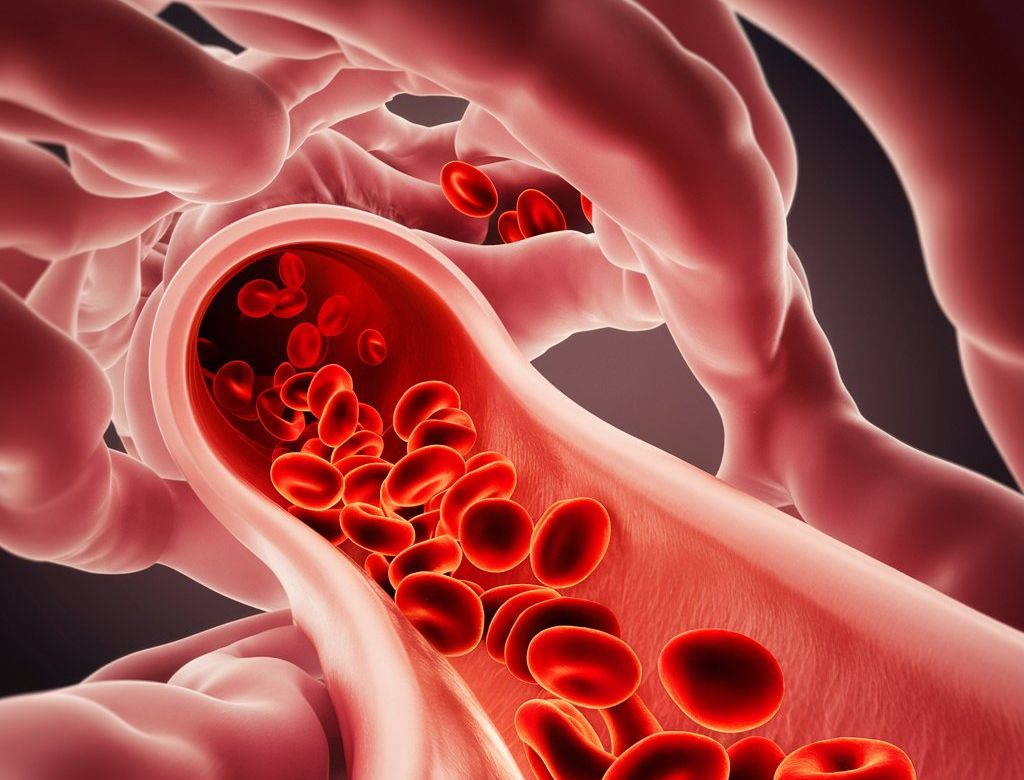
Effects on eyes and vision
One of the side but significant benefits of Ginkgo is the property of promoting blood circulation in the eyeballs. This was noted, among other things, in a study on glaucoma patients[4] who were given Ginkgo extract 3 times a day at 40 mg for two days. Ocular blood flow was measured before and after the intervention. It was noted that Ginkgo biloba extract significantly increased end-diastolic velocity (EDV) in the ocular artery. The authors suggest the possibility of using Ginkgo biloba in glaucomatous optic neuropathy, as well as in other ischemic eye diseases.
There are reports that Ginkgo supplementation is effective in treating age-related macular degeneration due to its free radical scavenging effects[1].
Good for seniors?
More like it! When analyzing the effectiveness of Ginkgo supplements in different age groups, it is seniors who enjoy the best results. The action profile of this plant is very conducive to the elderly, and with a clear conscience Ginkgo can be considered an anti-aging supplement.
The development of civilization is progressing and life expectancy is steadily increasing. Along with optimistic forecasts in relation to life expectancy for the next decades, there are also pessimistic predictions about neurodegenerative diseases and dementia. Society needs affordable, effective and safe ways to support brain health and reduce the risk of cognitive disorders. These tenets are met by the herb Ginkgo biloba, and its immense popularity should make us very happy.
The obvious advantage is Ginkgo's neuroprotective effect, which is gaining more and more ground with each birthday. In addition to this important aspect, Ginkgo also has a systemic effect on improving circulation, and it also has some benefits for glucose metabolism and overall inflammation control[3].
Dosage of Ginkgo supplements
The most common dosage is between 120 and 240 mg per day. The best practice is to divide the daily dose into 2 or 3 equal portions and take them at roughly equal intervals.
It is worth being patient, as Ginkgo supplementation should be long-term, preferably several months. For chronic ailments, use for a minimum of 8 weeks is recommended.
It is important to choose only standardized extracts of Ginkgo biloba leaves. The content of active ingredients in the leaves can naturally vary depending on many factors. Standardizing the extract allows you to approach dosage with greater precision and achieve reproducible results.
Are there any side effects or contraindications?
Ginkgo should not be used together with blood-thinning drugs, as it can then increase the risk of bleeding. Interactions may occur with warfarin, aspirin, antiplatelet drugs and other herbs with blood-thinning effects.
Ginkgo biloba preparations should not be used during pregnancy and breastfeeding.
Rarely noted side effects include[2]:
- nausea,
- vomiting,
- diarrhea,
- headaches and dizziness,
- palpitations,
- anxiety,
- weakness,
- skin rash.
Overall, however, Ginkgo biloba is considered a very safe and well-tolerated herb, as long as interactions are avoided.
Summary
Ginkgo biloba's effects mainly involve cerebral fitness and blood circulation, and it works best for people of advanced age. It is considered safe and rarely causes side effects, as long as one is careful about interactions and respects contraindications. Its immense popularity is fully justified, as the effectiveness of using supplements with Ginkgo extract is confirmed by hundreds of studies. This supplement is definitely worth recommending to any senior citizen.
Sources:
 ⮜ Previous article
⮜ Previous article
Salidrosides from Rhodiola rosea root - how do they work and what do you need to know about them?
 Next article ⮞
Next article ⮞
